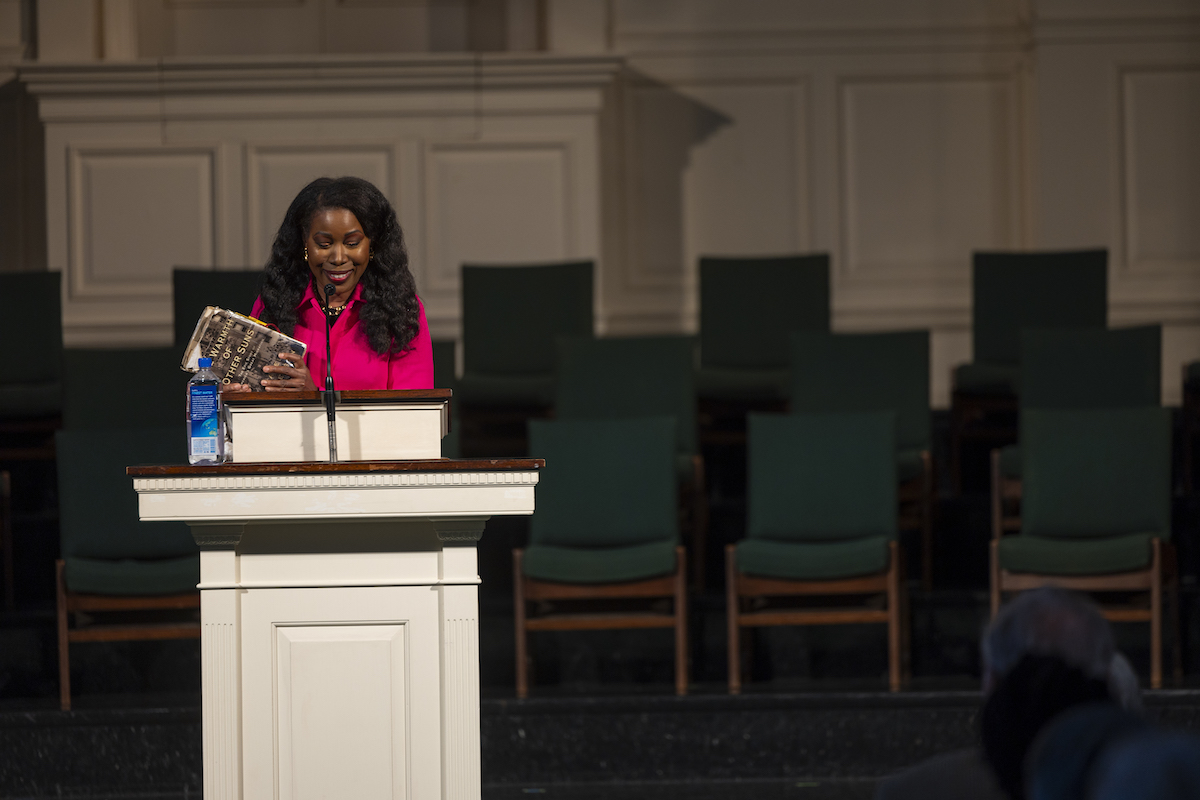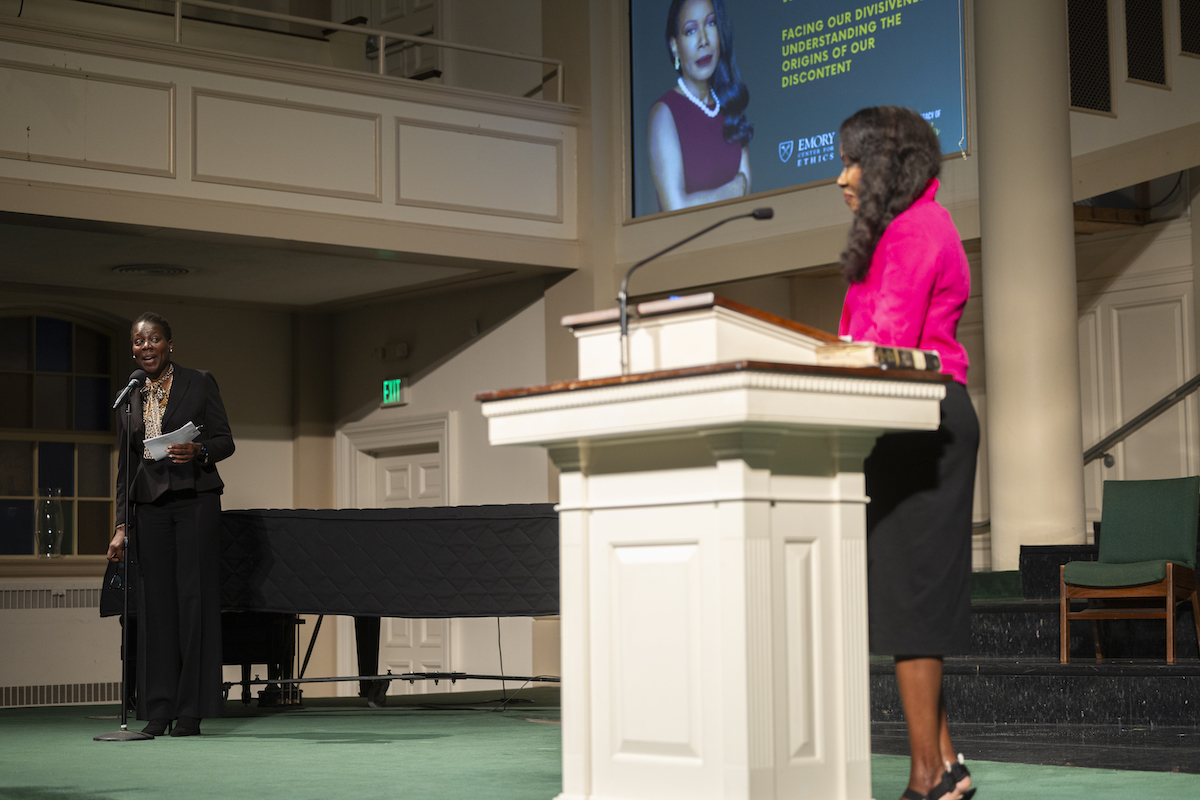As Isabel Wilkerson came onstage at First Baptist Church in Decatur earlier this fall, the audience stood.
It was a homecoming for the former Emory faculty member but, even more, it was a grateful acknowledgment of what was to come: a passionate, sharply observed analysis of how America has come to the present moment by a scholar who received the Pulitzer Prize in 1994 while serving as Chicago bureau chief of the New York Times and was awarded the National Humanities Medal by then-U.S. President Barack Obama in 2015.
The first Black woman in the history of American journalism to win the Pulitzer Prize and the first African American to be honored for individual reporting, Wilkerson describes her mission as being to “use the power of language and narrative to change how people see our country.” According to The American Prospect, Wilkerson’s work is “the missing puzzle piece of our country’s history.”
The talk on Oct. 18 marked the fourth-annual lecture in honor of Emory Center for Ethics founder James M. Fowler, with the series focusing on building connections and empowering collective action toward a more just, equitable and ethical society. In addition to the Ethics Center, other sponsors included the Office of Diversity, Equity, and Inclusion, Department of African American Studies, Emory Libraries, Faculty Affairs, Office of Spiritual and Religious Life, James Weldon Johnson Institute for the Study of Race and Difference and Laney Graduate School.
Books banned and beloved
In two landmark books, “The Warmth of Other Suns: The Epic Story of America’s Great Migration” (2010) and “Caste: The Origins of Our Discontents” (2020), Wilkerson examined the Great Migration, the movement north and westward undertaken by six million Black Southerners between 1910 and 1970, prompted by the conditions that Jim Crow laws created.
Wilkerson came to Emory in 2006 as the James M. Cox Jr. Professor of Journalism. Much of her research for “Warmth of Other Suns” was done during the years she was here. She held up a battered copy of the book that has been around the world with her and joked, “This book took 15 years to research and write. If it were a human being, it would be in high school today.”
Her books, though, have been battered in other ways — namely, when earlier this year a Texas county banned “Caste,” along with 16 other books, from its shelves. When a federal judge ordered the books to be restored, the county commissioners considered shutting down their library system to avoid complying with this order. “Who would have thought that authors, teachers and librarians would be on the front lines of democracy,” Wilkerson noted.
The great courage that spurred ‘The Great Migration’
In her talk, “Facing Our Divisiveness: Understanding the Origins of Our Discontent,” Wilkerson noted that the Great Migration marks “the only time in our country’s history that American citizens had to flee the place of their birth just to be recognized as the citizens they had always been. It was the seeking of political asylum from within the borders of one’s own country.”
Examples of unequal treatment under the law included the fact that in Southern courtrooms, there were separate bibles on which Blacks and whites swore to “tell the truth, the whole truth and nothing but the truth.” It was against the law for a Black motorist to pass a white motorist, and Blacks could be arrested for playing checkers with a member of another race. Most sobering of all, a lynching occurred every four days throughout the first four decades of the 20th century.
“This is not ancient history,” Wilkerson emphasized, contending that the 1965 Voting Rights Act was “the first year in which the U.S. lived into being a democracy.”
She told the story of a family of Alabama sharecroppers with 10 children who moved north, even naming their one son James Cleveland for the city to which they were bound. The young man went by “JC,” which his Northern teacher instead heard as “Jesse.” He went on to be known as Jesse Owens, winner of four gold medals at the 1936 Olympic Games.
Wilkerson made the case that Owens had opportunities in the North that he would never have had in the South — most notably, being able to join The Ohio State University’s track team. “He was not fit for a cotton field, but rather track and field,” Wilkerson noted.
Life in the North, though, came with its own share of challenges and indignities, one of which was the redlining and hyper-segregation that Blacks would experience in Northern cities. According to Wilkerson, while the labor of these newly arrived Southerners was welcome, Blacks were kept at a remove from whites.
When Martin Luther King Jr. traveled to India in 1959, he deliberately pursued a visit with the untouchables, now known as Dalit, the lowest stratum of castes in that country. He was shocked when the principal of a school he was visiting introduced him by saying, “Young people, I wish to introduce you to a fellow untouchable from the United States of America.”
Upon further reflection, however, King saw the relevance of the association the principal was making. “At that moment, 20 million African Americans were being held outside the body politic, excluded from almost every sphere of life — where they could go to school, where they could live, what kind of work they could do,” Wilkerson said.
What COVID knows
Turning to the present moment, Wilkerson touched on how COVID understands humankind, saying: “COVID did not care about color, nationality, immigrant status, gender, national borders or passports. COVID saw all humans for what we actually are: one interconnected and interdependent species. It saw what we have in common and what we have not seen for ourselves: that we are all in this together, and it is time we started to act like it.”
Wilkerson’s scholarship leaves little doubt that there are no winners in a caste system, then or now. As she considered the price of 12 generations in this country being subject to slavery, she said: “On those rice, tobacco and cotton plantations, there were opera singers, jazz musicians, playwrights, novelists, surgeons, architects, engineers. We know that because that is what their children, grandchildren and now great-grandchildren have chosen to become once they had the chance to choose for themselves what they would do with their God-given talent.”
While embracing hope, Wilkerson did not shirk from the task remaining to end hierarchies that make any of us “less than.” “Hope is necessary to have, but it is not sufficient on its own,” Wilkerson advised. “There is much work to do.”
Thankfully, there are young volunteers to assist. In the Q&A that followed Wilkerson’s remarks, Skye, age 12, wanted to know what advice Wilkerson had for “kids who want to go into journalism and make a difference.” Skye is the daugher of Oxford College professor Erica Oduaran.
“Learn your history — and tell it,” Wilkerson responded.
Photos by Kay Hinton, Emory Photo/Video.



